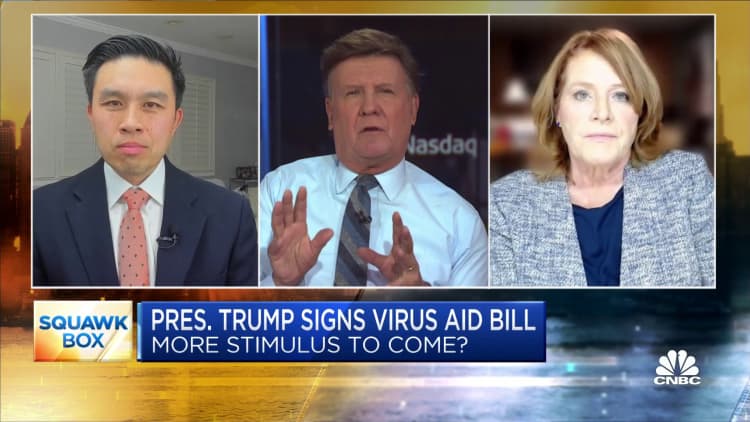To his critics, President Trump has an annoying habit of being right at times. A case in point is the long-awaited pandemic relief bill.
We were all grateful when he signed it on Sunday. It had been delayed for months by political gamesmanship and jockeying. Yet, his criticism of the relatively small cash payments included in this bill — $600 per adult and per dependent child for individuals making up to $75,000 a year — was spot on.
Most middle- and low-income Americans have, in one way or another, suffered financially from this pandemic, and their suffering has deepened over the past months as Congress dithered. Most will continue to suffer from the economic distress caused by Covid-19, which will endure for much of 2021.
Those $600 payments — only half the amount that Congress approved in the CARES Act last March — will soon be exhausted. The Senate should approve House legislation to increase them to $2,000. If not, the Biden administration should make this its first order of business next year.
The idea of unconditional cash assistance has been around for some time. With this pandemic, it is finally getting its due. Experiments dating back to the Nixon administration show that giving no-strings cash to low-income families reduces poverty rates, benefits family's health and improves children's' test scores.
More from Invest in You:
14 million won't miss week of unemployment pay, despite Covid bill delay
Trump signs off on $600 stimulus checks
How to make ends meet before Covid help arrives
Historically, such payments have been resisted with repugnant arguments that such "giveaways" will be squandered on cigarettes and alcohol or that they will provide disincentives for work. In fact, available research shows they are used to cover basic living expenses and have little impact on recipients' employment.
This has been true of how American households spent the first round of payments authorized last March. According to a study by the American Research Institute, the majority of those funds were spent on living expenses.
For households with combined incomes of less than $75,000, nearly 80% reported spending most of it on things like food, utilities and rent. About 54% of wealthier families — those making over $150,000 — also used most of the money to cover basic household needs. Some families reported putting most of it in savings: 9% of lower income households versus about 30% of wealthier families.
Critics of the payments argue that money used for savings instead of consumption does not provide economic stimulus. This is valid if the goal is solely to boost the economy.
But given the pervasive economic devastation caused by Covid-19, and the overall declining financial condition of America's middle- and low-income families prior to the pandemic, we should also be concerned about shoring up their precarious financial condition. A recent CNBC survey suggests that 61% of Americans will have exhausted their emergency savings by the end of this year.

Another advantage of unconditional cash assistance: It can be distributed quickly, which makes it particularly well-suited for sudden economic shocks. Thanks to yeoman's work by the Treasury Department, the vast majority of eligible families will receive the second round of cash payments within three weeks.
Contrast this to state-based unemployment compensation systems, which are collapsing under the weight of millions of claims. It takes time to accept and process applications and verify eligibility. According to a recent Pew study, only three states are now meeting the federal guideline that at least 87% of applicants receive their funds in three weeks. Backlogs have become the norm, with 14 states, including New York and California, meeting that standard less than 50% of the time.
Unconditional cash assistance also provides substantial collateral advantages. As families spend the money on goods and services, businesses benefit, as do state and local governments through increased sale tax revenue. Such assistance is also arguably more efficient in allocating resources than complex programs that restrict aid to specific purposes. Families know their own needs better than anyone and optimal economic allocation of those funds can be better achieved by letting them spend accordingly.
Americans seem to "get" the benefits of cash payments, even if Washington politicians have been slow to catch on. Two of 3 Americans support a second round of payments, according to one poll. A similar proportion think the checks in the current stimulus bill are too small.
Given the demonstrated inability of our elected officials to respond promptly when Americans are in need, the Biden administration should not only seek a new round of payments, but also the enactment of a permanent system that would automatically distribute funds when our economy suffers a severe shock.

The Federal Reserve could purchase special issue bonds to finance such payments, which would be a much better use of its printing press than the Wall Street-centric lending programs it pursued during the Great Recession and revived during this pandemic.
Then, as now, those programs have been a boon to financial markets but not much help to Main Street. The brunt of both crises has fallen hardest on low- and middle-income families.
Increased payments, combined with "auto-stabilizers" to shield them in the future, would be a good way for President-elect Biden to help set things right.
SIGN UP: Money 101 is an 8-week learning course to financial freedom, delivered weekly to your inbox.
CHECK OUT: Is student debt forgiveness 'fair'? 3 ethics and philosophy professors weigh in via Grow with Acorns+CNBC.
Disclosure: NBCUniversal and Comcast Ventures are investors in Acorns.





